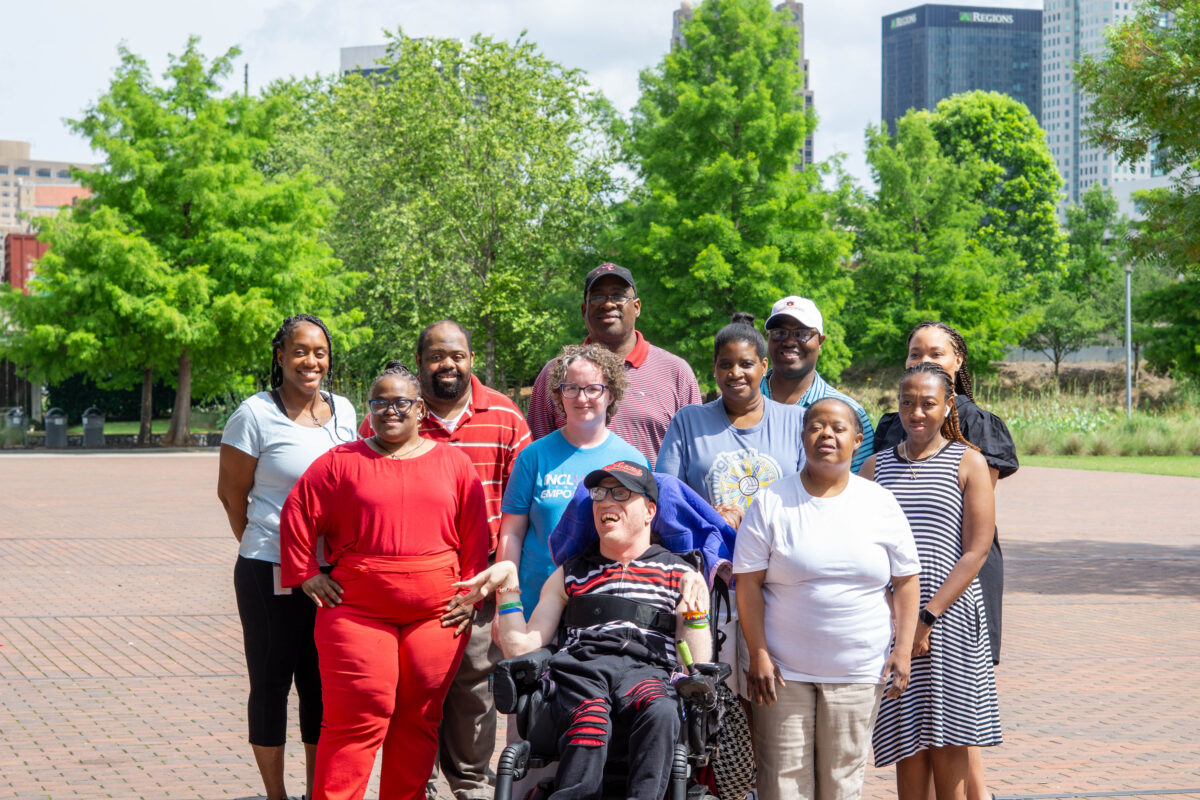Born at just 23 weeks, this little one now lives at home with those who love her—here’s her story
Reading time: 6 minutes
Sponsored

Born January 8, 2020 at 23 weeks and five days, Everleigh Odom spent the first 14 months of her life at The University of Alabama at Birmingham, Regional Neonatal Intensive Care Unit and Children’s of Alabama. Today, thanks to courageous decisions on the part of her parents Crystal and Alex, excellent medical care and a team of therapists from United Ability, the almost-two-year-old is thriving at home.
She lives with her family, including her doting big sister and the family dog. I had the opportunity to visit with the Odoms and their physical therapist at their Hueytown home. Here is their story.
Meet the Odom family

Mom Crystal, Dad Alex, four-year-old Adeline and almost two-year-old Everleigh welcomed me warmly into their Hueytown home. United Ability physical therapist Daphne Wallace—one of three Early Intervention therapists who makes regular home visits—joined us.
As we settled in, Daphne got right to work playing with Everleigh, who smiled happily. Big sister Adeline made sure her little sister was safe and comfortable with pillows and blankets, as Crystal and Alex began to share their story.
Everleigh’s early arrival brought unique challenges

Crystal’s second pregnancy started off much like her first. Until at 17 weeks, she began experiencing a feeling of pressure and received an emergency cerclage due to incompetent cervix. Ultimately, Everleigh was born prematurely at 23 weeks and 5 days.
Because she was so very young, her eyes were fused together, she was not able to breathe on her own and she needed the life-saving measures offered by the neonatal intensive care unit (NICU).
Over time, Everleigh was diagnosed with bronchopulmonary dysplasia (BPD), delayed milestones of childhood due to prematurity and cerebral palsy—the most common motor disability in childhood, according to the CDC.
A turning point in the hospital
By August 2020, Crystal and Alex faced a hard decision. They knew Everleigh still couldn’t breathe on her own, but they also knew that staying intubated in the hospital was delaying her development. Although it was scary to venture into the unknown, they knew in their hearts that home would be the best environment for her overall growth and well-being.
With the support of their medical team, they decided for Everleigh to have a tracheotomy. This would allow her to participate in Childrens of Alabama’s Pulmonary Technology Dependence Program.
Today, she breathes through the “trach”—an opening in her throat into the trachea, or “windpipe,” attached to a tube connected to a portable ventilator that allows her to move and play freely. Since March 2021, Everleigh’s able to live in her own home, surrounded by the people who love her.
But getting there has required a lot of support.
Enter United Ability: learning how to live at home with early intervention

Luckily, in addition to the medical team that cared for Everleigh, the Odoms also had access to a social worker who told them about United Ability.
The first thing United Ability did was set them up with an IFSP, or individualized family service plan. They worked with a service coordinator named Hannah, who worked with the therapists to determine what types of therapy Everleigh needed, and at what level.
With Everleigh, they started from the beginning, Crystal explained. She wasn’t rolling over completely, trying to crawl or sitting up.
But now, “we see Daphne and our other therapists and they have been phenomenal in helping give us the tools to help with Everleigh’s development, including physical therapy, occupational therapy, speech therapy and equipment. We’re thankful that United Ability has given us those tools and helped us learn effective ways to help her develop.”
Early intervention with United Ability makes a world of difference

According to Daphne Wallace, United Ability is the second largest early intervention provider in the state, serving over 430 children a month in the following counties:
- Jefferson
- Shelby
- St. Clair
- Blount
- Etowah
Their main purpose is to train the caregivers in their natural environment, whether that’s home, daycare, the park or in the community.
“We train the caregivers because us coming once a month isn’t going to change anything—them doing it every single day is. Each session we come to the child’s natural environment, show the family or caregiver specific ways to help their baby, and then have them do it to make sure that they’ve got it. We are available for any questions the family has, and we always leave activities for the family to work on until our next session. If needed, we also bring equipment so we can help each child reach their highest potential.”
Daphne Wallace, physical therapist with United Ability
There are two main ways to get connected for Early Intervention services at United Ability:
- Parent or family member referral: call Jessica Letson, Assistant Director of Early Intervention at 205.944.3978. If the child qualifies, United Ability will reach out to the family’s pediatrician to inform them of the results. If the child does show signs of delay, they’ll recommend early intervention.
- Pediatrician or specialist referral: call Jessica Letson, Assistant Director of Early Intervention at 205.944.3978 for the child or recommend that the parents call United Ability on that number.
Early intervention in the state of Alabama is from birth to age three and is provided free of charge.
A final word from Crystal on United Ability early intervention

“I just hope that this story encourages some parents who are going through something to advocate for their child. Don’t look at needing support as a negative thing—look at it as a positive thing that you get to utilize those resources and get to help your child reach their potential. When Everleigh was born as early as she was, it was intimidating. Now, we’re very blessed that we get to take care of her and help her grow.”
Crystal Odom
Learn more about United Ability and the life-changing services they provide: visit them on their website or follow them on Facebook or Instagram today.
Sponsored by:

 19100 views
19100 views

